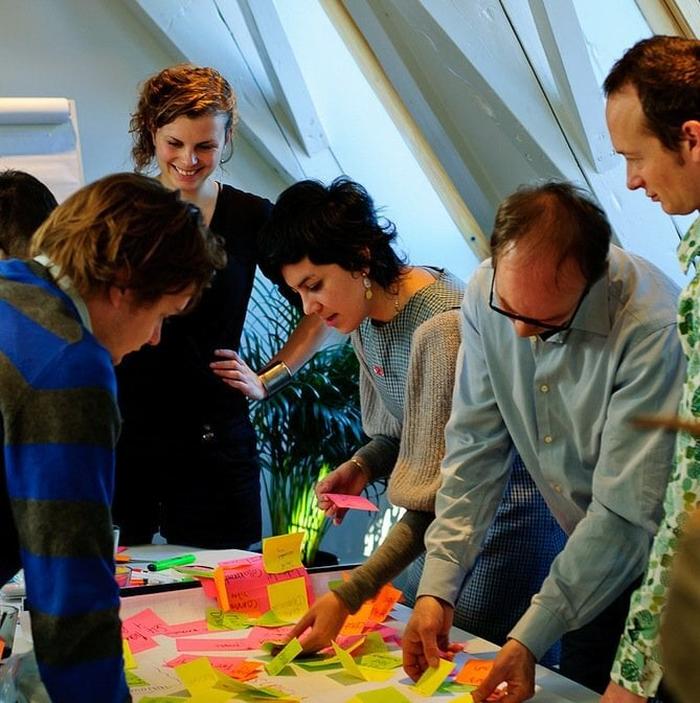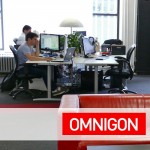
Ever wondered how to get started working in PR, entertainment, finance, or another profession? Follow along with our "How to Break Into" series, a guide to breaking into these cool fields and more, brought to you by those who know it best.
Do, think, create, strategize. If you work in innovation, you literally do it all.
OK, more specifically, you come up with products, services, processes, and strategies that help companies move into the future. And that could mean anything from creating a new beverage for a soft drink company to enhancing a bank's digital services to developing a pioneering hotel concept.
Sound intriguing? We sat down with two innovators at the top of their field and learned more about how to break in.
Annabel Acton
Inventor, ?What If! Innovation
Brief Description of Job: I come up with new products, services, and business models to fuel new waves of growth for my clients [which include Virgin, PepsiCo, and Google].
Years of Professional Experience: 8
Why did you choose this field?
I love everything about ideas—hatching them, developing them, and executing them. My foray into this field came after an enjoyable exploration through the communications world. I started in advertising, but realized quite quickly it wasn't for me when they made me choose between being strategic or creative. It seemed like a false choice, as I had heart and skills for both.
So I moved into marketing consulting for five years and loved it. I learned a lot about how business works, how to develop ideas, and what matters to both consumers and boardrooms. But my favorite part of the job was always ideating, in any shape or form!
Soon enough, I discovered that innovation consulting was a real job and made the leap. I love the learning, discovery, and collaboration innovation demands. And most of all, I love the people it attracts—innovators are people who believe the world can and should be a better place. It’s a very inspiring environment to work in.
What was your first job, and how did you land it?
My very first job out of college was in advertising. I called the CEO directly (after some serious Googling) and told him I was a big fan of his agency and was looking for work. We chatted for a while and following our call, he emailed his Managing Director and asked him to meet me. The Managing Director thought it was a mandate and hired me soon after. We all had a good laugh once I revealed that I was, in fact, a virtual stranger.
Whether a result of this experience or not, I’ll always make time for someone who wants to chat about my line of work, and I believe most people will. It’s worth a shot, and after all—the worst thing that can happen is that they say “no.”
What has been the most surprising thing about working your field?
I work on projects spanning all industries, from baby care to insurance to e-commerce to alcoholic beverages. When some projects come in, they capture your imagination from the get-go, but to my surprise, all of them are truly fascinating. Even the ones you expect to be dull end up being momentous and brilliant challenges to crack when you dig a little deeper.
The other surprising thing is how much innovation can unite a team. The unpredictable nature of the innovation process, the riskiness that comes with sharing creative ideas, and the natural highs and lows that happen when you bring an idea to fruition create powerful ties between people and teams. Everyone has to roll up their sleeves and get a little dirty. Ultimately, creativity is a human endeavor and it’s a powerful reminder that even the most senior business people are still people.
What advice would you have for someone breaking into your field?
Innovation requires a different set of skills. It’s equal parts creative and strategic. It demands collaboration and, importantly, the ability to be comfortable sailing without direction. This ambiguity makes a lot of people nervous, but it’s fundamental to success in this field.
My biggest piece of advice to budding innovators is to make creativity a habit. It’s easy to teach someone how to do a job, but it’s much harder to teach someone how to think differently. Question everything, take a slightly different view of events, and challenge assumptions. Wherever you are, try to do things a little differently. Sadly, this type of thinking is the stuff that gets beaten out of us in many jobs.
You can develop this skill by adding a creative slant to everything you do: Ask questions, consider a different viewpoint, and look to new places for answers. Creative thinking is a highly prized and increasingly valuable skill to have. We welcome people with all types of professional experience, so long as they can think a little left of center.
Sara Holoubek
CEO & Founder, Luminary Labs
Years of Professional Experience: 15
Brief Description of Job: I am responsible for the overall success of our organization, an innovation and strategy consulting firm that helps organizations transform and become more resilient. I also spend a significant amount of my time on thought leadership.
Why did you choose this field?
Innovation was less of a career choice, and more of a result of my career path; I consistently chose positions at companies on the bleeding edge of technology during moments of massive industry transformation. For example, I entered the digital space in the late 1990s when we were all literally making it up. Every project was an incredible exercise in invention.
In 2003 I joined iCrossing as Chief Strategy Officer. This was before Google was public, and as laughable as it is now, my peers thought that I was making a terrible career choice for taking a bet on search. I think we all know how that “search thing” played out.
These early experiences fostered a sense of invention and possibility that directly translate to business outcome.
What has been the most surprising thing about working your field?
Ideas are very easy to come by—operationalizing ideas is hard. And yet, that is where true innovation is born. The ability to adopt, operationalize, and iterate continuously with the end goal of increasing relevancy to respond to changing economic, technological, and cultural conditions is not an overnight exercise.
We take great pride in successes with the most unlikely organizations, the incumbents who are able to radically reframe their role and create real value. It’s one think to work for an innovative company—it’s entirely different thing to help a traditional company innovate.
What advice would you have for someone breaking into your field?
While many would suggest that startups are good training for innovation, I would argue that the best place to start is a large corporation in an industry in the midst of transformation. The larger and messier, the better.
Here’s why: Friction equals opportunity for innovation, and large, incumbent organizations are a great place to learn how to navigate complex systems, understand how markets were made in the past, and identify the conditions for success in a particular environment.
So in short, earn your stripes in the field before advising others.
What is different about the hiring process in your field than in other fields?
Helping companies operationalize innovation requires a very specific set of skills and experience that are not specific to a degree or a particular career path. And so our hiring process differs in that it is structured to identify key attributes such as super-flexibility and a level of comfort with ambiguity.
And while we like smart people, we like smart people who know how to operationalize ideas even better. All too often, companies divide roles into “thinkers” and “doers.” We like “thinker-doers.”
The traditional interview process makes it relatively easy to know if someone is a thinker. It is harder to know if someone is a doer. For this reason, we frequently ask for concrete examples that lead to true value creation. And our bar for value creation is relatively high.


